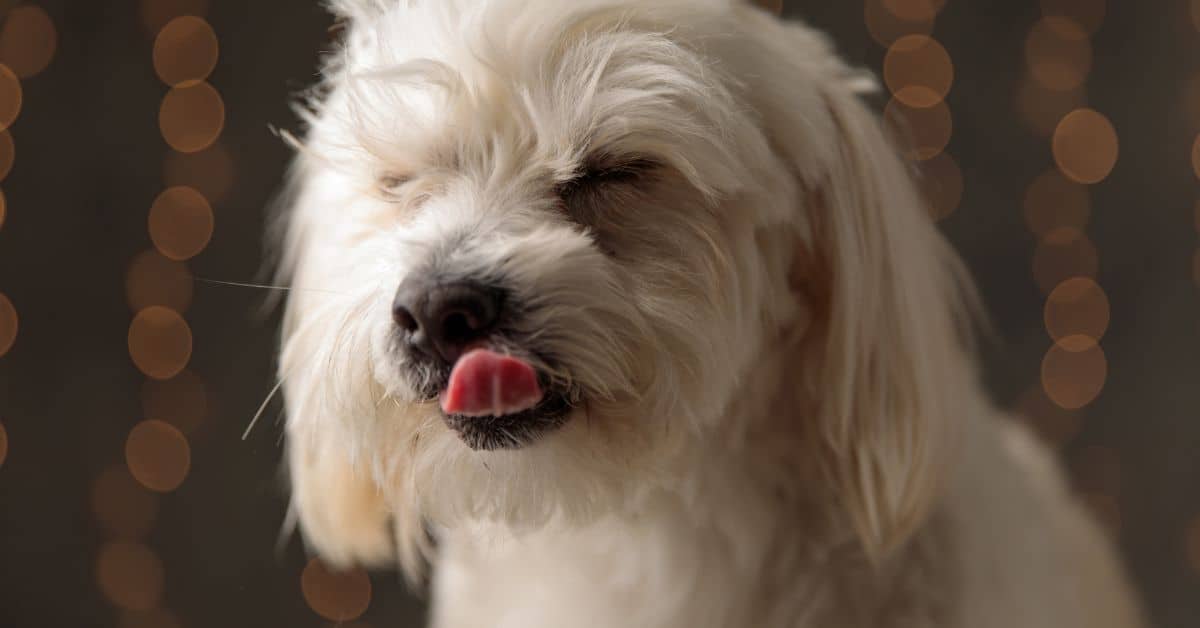Have you ever watched your dog lick something and then noticed their mouth start to shake or quiver?
It’s like they’re telling us, “Hmm, that was different!” This wiggly mouth thing isn’t just a funny trick—it’s something many dogs do.
So, why do dogs mouths quiver after licking?
Let’s dive deep into this doggy mystery and find out!
Reasons For Mouth Quivering
Reaction To Flavors
Let’s start with flavors.
Just like kids trying a lemon for the first time, dogs experience flavors intensely.
Their taste buds, though fewer in number compared to humans are quite sensitive to certain tastes.
Sweet, salty, sour, and even the taste of water have specific regions on their tongue.
When they encounter an exceptionally strong or unfamiliar flavor, it might send a tiny shock wave, making their mouths tremble for a brief moment.
Emotional Responses
Think of your favorite childhood candy.
Does remembering its taste make you smile?
For dogs, flavors can be a trip down memory lane.
While they don’t reminisce about candies, a specific flavor might remind them of a treat they got as a puppy or a meal shared with a beloved companion.
This powerful connection between taste and memory can lead to that heartwarming quiver.
Health Concerns
But not all quivers are about taste adventures or memories.
Sometimes, it’s a sign of discomfort.
Just as we might wince from a cold ice cream on a sore tooth, dogs might react to pain.
Their teeth and gums are susceptible to problems like decay or infections.
If they’ve recently licked or chewed something that irritates a sore spot, their mouth might twitch in response.
Whisker Sensitivity
A little-known fact about dogs is the magic of their whiskers.
These aren’t just regular hairs; they’re packed with nerves, making them super sensitive.
Think of them as mini radar detectors, picking up even tiny changes in air or temperature.
After licking, the dampness around their mouth can amplify these sensations.
So, the next time their whiskers twitch and their mouth quivers post-lick, it’s those super-sensitive whiskers at work!
What Should Dog Owners Do?
Monitor Their Food
A responsible dog owner is always watchful.
Dogs, curious by nature, will often lick or taste new things they find, be it in the park or even in your backyard.
Some plants or insects can be harmful if ingested.
It’s vital to ensure their diet is healthy and doesn’t include anything that might harm them.
And if you’re introducing a new treat, always read the ingredients.
Some additives might cause reactions in certain breeds.
Dental Care
While we often hear about brushing our dog’s fur, their dental hygiene is sometimes overlooked.
Did you know that dogs can also get cavities and gum diseases?
Dental problems in dogs are more common than most owners realize.
Regular brushing with dog-safe toothpaste and annual vet dental checks can save your furry friend from potential pain and health problems.
Offer Comfort
And, of course, our dogs seek our love and comfort.
If you notice your pet reacting strongly to a new flavor or constantly quivering post-lick, a gentle pat or some soft words can go a long way.
They might not understand everything you say, but they surely feel your reassuring presence.
Is Quivering A Cause For Concern?
Usually It’s Normal
Our pets are no different from us in many ways.
Remember that time you sipped a super cold drink, and your face involuntarily twitched?
Similarly, dogs have their own set of reactions to different experiences.
A slight quiver post-lick or after tasting something might just be your pup’s way of saying, “Well, that was unexpected!”
Most times, these reactions are harmless and just another layer of their charming personalities.
Watch For Other Symptoms
However, as with any behavior, it’s essential to look at the bigger picture.
While a quiver here and there might be natural, other signs could indicate discomfort or even health issues.
If your dog starts avoiding their food, frequently paws at their face or shows a sudden shift in mood, it’s worth paying attention.
These signs, combined with persistent mouth quivering, might indicate dental problems, internal discomfort, or even allergies.
Trusting Your Gut
Here’s the thing – no one knows your dog better than you.
You’re attuned to their usual behaviors, their happy tail wags, and those little sounds they make when content.
So, if your inner alarm bell starts ringing, trust it.
Sometimes, it’s just a small thing that feels “off.”
If ever in doubt, it’s always a good idea to consult with your vet.
They’ll either reassure you that all’s well or provide guidance if there’s an issue.
It’s always better to be safe and informed.
Navigating the world of dog behaviors can feel like embarking on a thrilling treasure hunt.
Each behavior, each little quirk, is a piece of the jigsaw that makes up your beloved pet.
While mouth quivering post-lick might seem like a tiny, insignificant behavior, understanding it brings us one step closer to fully comprehending our canine companions.
Keep observing, keep learning, and remember – every wag, bark, and quiver is a page in the delightful story of your journey together.
Before You Go…
Now you know why dogs mouth quiver after licking.
If you want to learn more, read the following articles too!
Or watch this video:


